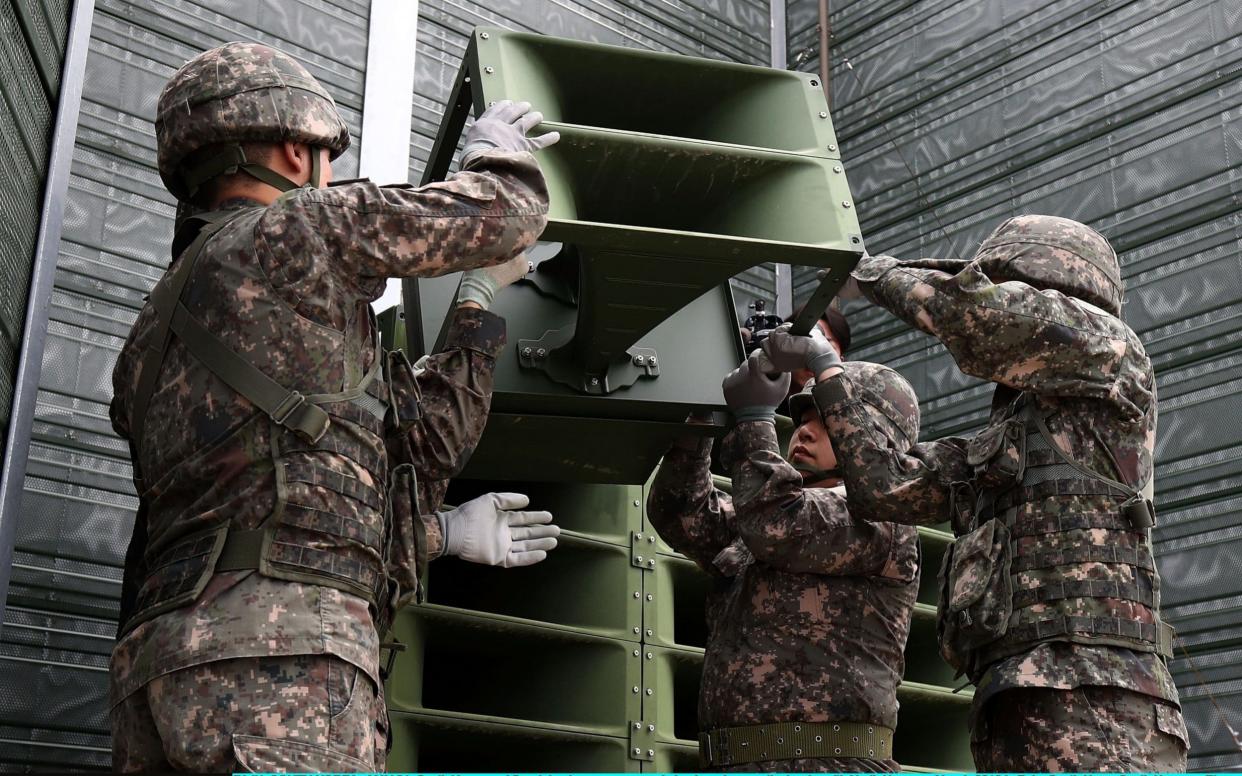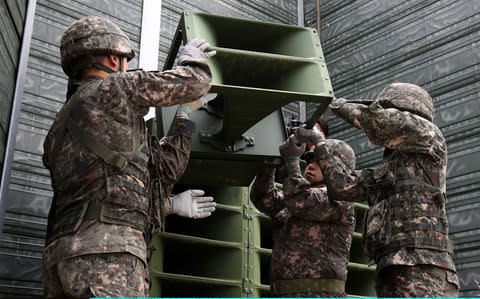South Korea, China and Japan to hold summit, as Pyongyang starts removing propaganda speakers

South Korea, China and Japan will hold a trilateral summit in Tokyo next week, in the latest round of fast pace diplomacy to resolve tensions over North Korea’s nuclear weapons programme.
The meeting will bring together Moon Jae-in, the South’s president, Shinzo Abe, the Japanese prime minister, and Li Keqiang, the Chinese premier, for the first time in more than two years.
It follows a historic summit between Mr Moon and North Korea’s Kim Jong-un last Friday, where they vowed to pursue “complete denuclearisation” and a peace treaty to formally end the 1950-53 Korean War.
The dramatic pageantry of their first ever negotiations set a positive tone for future talks between Kim and US President Donald Trump, expected in late May or early June.
However, experts have sounded a note of caution, warning that similar pledges have fallen by the wayside, and pointing out that no timetable or conditions have been decided to establish how Kim would give up his nuclear weapons.
A few days before Friday’s summit, the North Korean leader did, however, promise to halt all missile tests and dismantle his country’s Punggye-ri nuclear test site.

South Korea on Tuesday asked the United Nations to help verify the planned shutdown, due to begin later this month.
Mr Moon made the request in a phone call with Antonio Guterres, the UN secretary general, South Korea’s Yonhap news agency reported.
On Sunday, Mr Moon’s office revealed that Kim would invite experts from South Korea and the US to the country to ensure “transparency” around the site’s dismantlement.
Presidential spokesperson Yoon Young-chan said that Kim had revealed during the summit that he had no intention of targeting the US or the South with nuclear weapons, reported CNN.
“There is no reason for us to possess nuclear weapons…if mutual trust with the United States is built through frequent meetings from now on, and an end to the war and non-aggression are promised,” Kim was quoted as saying by Mr Yoon.
Kim also refuted claims by Chinese scientists earlier in the week that parts of the site had been so badly damaged by previous explosions that the site was useless.
"Some claim we are closing down an unusable test site, but if they come and see, they will understand that there are two bigger tunnels than the existing test facilities and that they are in a very good condition," Kim said.
In another positive gesture towards peace, the South’s defence ministry said it had seen signs that the North had started dismantling loudspeakers that blared propaganda across the border.
The de-escalation in propaganda from both sidescomes amid rare reports from inside North Korea that the public is aware of ongoing talks and hopeful for change.
“Right now you can just stop anywhere and hear talk of unification all around you”, a resident of the South Hamgyong Province told the Daily NK news web site.
“Members of the younger generation especially are expressing hopes that they may shed the [socialist] organisational restrictions after unification or that they will watch South Korean movies for a whole month straight after other controls and crackdowns are lifted”, the unnamed source said.
Even members of the “hostile class” are holding out hope that change might mean that relatives will be released from the North’s political prison camps.
The Daily NK quoted a source in Ryanggang Province as saying that a neighbour has been given renewed hope of seeing her younger sister, who was sent to prison 18 years previously, even though nothing has been heard about her well-being since.
Korean detente How did we get here?
“The woman had become really dispirited about her younger sister and lost hope, but now, because of expectations surrounding the inter-Korean summit, they are holding out hope that unification might mean the release of her family members”.
Dreams of previously unthinkable freedoms are being tempered by realism, however, with a resident of North Hamgyong Province saying: “Most people are generally quiet, but they have really big expectations for the future. But they also understand that lots of things need to develop a certain way, and then we can all be joyful together”.
Despite the speakers being switched off, North Korean defectors in the South continued their campaign of sending water bottles filled with rice and K-pop-loaded USB sticks floating towards their homeland.
Jung Gwang-il, a former North Korean political prisoner, and other activists tossed bottles into the sea from an island, hoping the tide will carry them northwards.
Korea summit | Read more
"What is one thing that Kim Jong Un hates the most?" he asked. "It's North Koreans becoming aware of the reality."
Park Jung-oh, another defector, added: "We all lived in North Korea for at least 30, 40 years so we know exactly what the people there want and need," Park said.
"When they watch the content of our USB sticks, they will realise that they have been tricked by their government," he said.
Films and television programmes from abroad have long been banned in the North due to the regime’s fear that it will show its citizens the high living standards of foreigners, while travel abroad was impossible unless a person was willing to take their chances and defect.
On Tuesday Moon Jae-in, South Korea's president, asked the United Nations to help verify North Korea's planned shutdown of its nuclear test site. Moon made the request in a phone call Tuesday with UN Secretary-General Antonio Guterres, Yonhap news agency reported.

